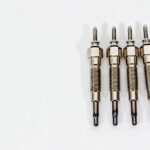Protecting your engine from harmful contaminants is crucial for its longevity and performance. One of the most effective ways to do this is by using the right oil filter. Finding the correct oil filter for your vehicle ensures clean oil circulates through the engine, preventing damage and extending its lifespan. This article will guide you on how to find the perfect oil filter for your car.
Matching Your Vehicle and Driving Style
The first step in finding the right oil filter is understanding your vehicle’s needs and your driving habits. Different vehicles and driving styles require different levels of filtration. A heavy-duty truck used for towing will need a more robust filter than a compact car used for city driving. Consider factors like:
- Vehicle Type: The make, model, and year of your vehicle determine the specific oil filter size and specifications.
- Driving Conditions: Frequent stop-and-go driving, off-roading, or towing require a filter with higher capacity and efficiency.
- Oil Type: The type of oil you use (conventional, synthetic blend, or full synthetic) can influence the filter choice. Some filters are designed for specific oil types.
Common Oil Filter Issues and How to Avoid Them
While oil filters are generally reliable, some common issues can arise:
- Leaks: Leaks often result from improper installation, such as loose fitting, cross-threading, or a double-gasket situation. Always ensure the old gasket is removed and the new filter is tightened according to specifications.
- Clogging: Over time, filters become saturated with contaminants, reducing their effectiveness. Regular oil and filter changes prevent clogging and maintain optimal filtration.
The Importance of Changing Your Oil Filter
Changing your oil without replacing the filter is like taking a shower and putting on dirty clothes. The old filter contains contaminants that will quickly contaminate the new oil, negating the benefits of the oil change. A clogged filter restricts oil flow, leading to:
- Reduced Lubrication: Insufficient lubrication causes increased friction and wear on engine components.
- Engine Overheating: Restricted oil flow hinders the engine’s ability to dissipate heat, leading to overheating.
- Engine Damage: Accumulated contaminants and inadequate lubrication can cause significant engine damage, potentially leading to costly repairs or engine failure. Always change your oil filter at the recommended intervals specified in your vehicle’s owner’s manual.

